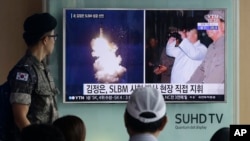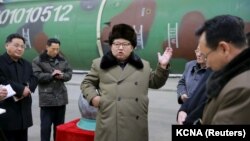Washington and Beijing’s longstanding agreement on the need to persuade North Korea to give up its nuclear ambitions is, analysts say, splintering over rising tensions in the region and diverging national interests.
American and South Korean officials, as well as analysts from China and Russia, addressed the increasingly complex security situation on the Korean peninsula at the Seoul Defense Dialogue on Thursday, organized by the South Korean Ministry of Defense.
Stay the course
Kim Hong-kyun, the South Korean Special Representative for Korean Peace and Security Affairs, called for continued international support to pressure the Kim Jong Un government to curb its defiant and continued development of nuclear weapons and ballistic missiles.
“Pyongyang may believe that if it persists in conducting these provocations on a routine basis the international community will somehow accept them as a given reality but they can’t be more wrong,” Kim said.
The latest round of United Nations sanctions caused economic pain, especially, Kim said, in trade, shipping and finance. However, since the new restrictions were imposed in March, North Korea has conducted 20 tests of short and medium range missiles, including submarine-based launches, advancing its capability to reach the U.S. mainland with a nuclear strike.
Both Kim and U.S. Undersecretary of Defense David Shear noted that diplomatic outreach is at a standstill as both Seoul and Washington demand that Pyongyang first take significant action to dismantle its nuclear program before any talks can occur.
“Unfortunately, today there have been no credible signs that North Korea is ready to move down this path,” Shear said.
China
For sanctions to be effective, China’s support remains crucial as it is North Korea’s economic lifeline. Nearly 90 percent of all North Korean trade flows through China.
Shi Yinhong, a professor of international relations at Renmin University in China, said officials in Beijing have doubts that sanctions alone will force Pyongyang to change.
He noted that China’s temporary halt of aid and energy supplies after North Korea’s 2013 nuclear test seemed not to have any effect, other than to damage relations between the traditional allies.
“What has China received from such a hardline approach? We have still not changed their radical attitude towards nuclear weapons,” Shi said.
Shi expects Beijing to maintain its current enforcement level of sanctions that critics say is lax, but will likely deviate from Washington’s stance by opening new avenues of unconditional dialogue to improve Sino-North Korean relations.
THAAD
Regional concerns over China’s military build-up in the South China Sea, conflicting claims between China and Japan over the Senkaku islands, and Beijing’s opposition to the U.S. and South Korean decision to deploy the THAAD (Terminal High-altitude Area Defense) missile defense system are making cooperation on North Korea more difficult.
Beijing sees THAAD in particular as part of the U.S. military “pivot” to Asia, and Douglas Paal, the Vice President for the Carnegie Endowment for International Peace, said China could retaliate against South Korea to establish its regional dominance.
“China seems to be bent on a two-track policy, treat the U.S. with a certain amount of respect, avoid provocation, but teach lessons to China’s neighbors that they need to be more obedient towards China,” Paal said.
Feodor Voitolovskiy of Russia’s Institute of World Economy and International Relations, said Moscow sees its deployment as a confrontational move by the U.S. even though THAAD’s powerful radar poses no real threat to Russia.
“This system is one more barrier - political, military barrier - which is being built between China and American allies in Asia Pacific, (and) between Russia and American allies in the Asia Pacific,” Voitolovskiy said.
Professor Shi said protecting North Korea has become more important for China to counterbalance the growing American military presence on the Korean peninsula.
Paal said he does not expect any further movement to resolve the growing North Korean security crisis initiatives until after the U.S. presidential election in November. No matter who becomes the next president, he said, there will likely be an evaluation of the current policies and new efforts made to either increase pressure on Pyongyang or begin talks.
Youmi Kim in Seoul contributed to this report.







